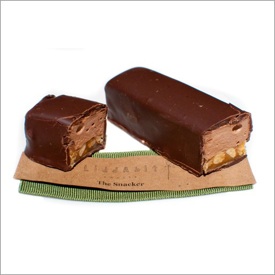Liddabit Sweets, Artisanal candy makers, Liz Gutman, Jen King, Brooklyn Flea, Marlow & Daughters, Northern Spy Food Co. Bedford Cheese, Chocolate, Candy, Sweets, Snacker Bar, Sustainable, Seasonal, New York, Manhattan, Brooklyn, Local Food Movement, Bakers, Candy Makers, Pasty Chefs


Brooklyn, NY
Q & A with Liz Gutman of Liddabit Sweets

Q. Please tell us a little bit about Liddabit.
A. Jen King and I founded Liddabit in April of '09. We met at the French Culinary Institute while completing the Pastry Arts diploma course in '07-'08. We discovered we had a lot of common interests, food wise - using super fresh and local ingredients, making everything by hand, and keeping quality standards extremely high while injecting a bit of humor and whimsy into our creations.
Q. Some of your candy is inspired by more mainstream versions - can you tell us what the creative process is for arriving at your rendition?
A. The kernel of the whole concept of Liddabit really started when we realized we wouldn't be able to add much to the chocolate scene by making bonbons. We were relatively new at this, and there's a lot of highly skilled competition out there in terms of more classical flavors and techniques. So we said, well, we know how to make nougat, we know how to make caramel - why couldn't we make a really delicious, small-batch version of a Snickers bar? Someone had to start making those back in the day anyway, and they probably tasted more like our version, the Snacker, when they were made fresh with better ingredients.
Q. Where do you find your inspiration?
A. That comes from everywhere. If we have a really refreshing summer drink, we think of how it could be made into a jelly candy. Favorite treats of ours, like s'mores and pie, get turned into candy bars. We're very big on nostalgia and how amazing sweets used to taste when you were a kid - we try and recapture the experience of that, rather than just throwing the flavors or components together and saying “good enough.”
What's it like to eat a s'more? Crunchy graham cracker, gooey chocolate, caramelized marshmallow - how can we put that in bar form? It's also important to us to cut down on sugar whenever possible - we like flavor, not just sweet tastes. This is also why we add complementary flavor components to a lot of our stuff - salty, smoky, bitter, tangy.
Q. How hard is it to maintain your focus on local and seasonal ingredients?
A. We have to pick our battles. Some ingredients are out of our reach, cost-wise. We try and get as many of our “starring” ingredients (the beer and pretzels in the Beer & Pretzel Caramel, the jam in the PB&J bar, the honey in the Honeycomb) as locally as we can. It's important to us to work with purveyors who care as much about the quality of their product as we do about ours. When we can't do local, we go organic as much as possible. It's definitely an uphill battle, but we're taking it one step at a time, and feel that further local and seasonal sourcing is something we can always be striving for.
Q. Are there things that you would love to use, that you shy away from because they are not local?
A. Sometimes. If we can't use at least a couple of local ingredients in something that might taste really amazing, we're likely going to shelve it until we can find a way to make it work. We have to compromise sometimes - we'll use an exotic, non-local ingredient for a limited-run sweet, like our recent passion fruit/chile caramel. But for everything we make on a regular basis, there has to be some local and/or seasonal aspect. It can be limiting, but in a lot of ways it can be very satisfying creatively to work within constraints and still be able to come up with great products.
Q. How hard is it to invent something new?
A. Thinking of new ideas is not difficult at all. We do it all the time. It's hard NOT to come up with great ideas. But - and I think this is true of a lot of small-business owners - there's only so much time in the day; and the process of recipe-testing and prototype-tweaking is time consuming. That's the hardest part, getting the idea to become a real tangible thing.
Q. Any combinations that you’ve tried that just didn’t fly?
A. We did a ricotta-grapefruit caramel around the time we started on the ricotta-orange; it was good, but not quite good enough. We went with the orange.
Q. We know it’s difficult to single out a favorite candy, like picking your favorite child, but do you have something in your product line that you can’t stop eating?
Q. Jen would say the Beer & Pretzel Caramel. I'm completely powerless against the King Bar.
Q. The Brooklyn Flea was your launching pad, how did that initially come about and how important has it been for business?
A. I'd just heard great word-of-mouth about the Flea from my friends, and I'd seen that Mast Bros, Nunu, and other foodies had gotten their start there, so it seemed like a good place for us. We applied a few weeks before the Times “check out the Brooklyn food movement” article came out, and we were like... “crap, they'll never let us in now.” But something we did caught their attention (I think it was the Honeycomb candy), and we were thrilled to be accepted! That really jump-started everything - we got some initial press from that, and we wouldn't be near where we are without the Flea. The interest and exposure we get from being involved with them has really been key to our success.
Q. What’s the most challenging aspect of being a small company?
A. You know how people talk about having to wear many hats? We wear every hat imaginable, plus a couple we didn't even know existed. We do pretty much everything - all aspects of production, ordering, shipping and receiving, deliveries, PR, wholesale accounts, invoicing, packaging, finances, setting up and working the markets. We have some amazing interns and employees who help us out, but we still carry the majority of the work for everything. Keeping all those balls in the air is the biggest - really the only - struggle. But you find ways to take it one day at a time, and we're starting to work on letting go of total control in some of those aspects and delegating a little. You have to at some point, in order to expand.
Q. What’s the best part about being a small company?
A. We get to do what we love, and we're only answerable to ourselves and each other. You have to be more than a little crazy to run your own business; but the freedom to do with it as you see fit is really irreplaceable. Terrifying and stressful, certainly; but more rewarding than working for someone else can ever really be.
Q. Who are the purveyors that inspire your creativity, what product, and why?
A. The ricotta-orange-honey caramel, which has gotten really popular, started as an excuse to put Salvatore Bklyn ricotta in something.
We love working with other small producers and purveyors; it's not just about the ingredients, it's about the relationships you forge with other food people. Luckily, food people tend to be kickass in general.
Q. Do you have a go-to knife, gadget or ingredient that you would advise a home baker to stock?
A. A stand mixer is really a must for any serious baker or confectioner. You can get by with a hand mixer; but if you make a lot of doughs, or want to do any aerated sweet like marshmallow or nougat, it makes your life a lot easier.
What we use the most are really the basics, though - a set of mixing bowls, a couple heavy saucepans, a good heatproof spatula or two, and a candy thermometer are the tools we use the most (aside from our hands, of course!) .
Q. Any exciting projects in your future?
A. We're working on delegating some of the kitchen labor right now so we can get to work on new stuff - but we've been working on a coffee & donut candy bar, and you can count on some awesome new fruit jelly flavors in a few weeks, when the greenmarket fruit is abundant.
We'll be at the New Amsterdam Market this summer, as well as the Brooklyn Botanic Garden's 100th anniversary event in June. Lots of exciting stuff!
Who
Artisanal candy makers, Liz Gutman and Jen King.
Why
They use local, sustainable, seasonal ingredients in their delectable and delicious candy and their tweets are very entertaining.
Consider
You are paying for an artisanal, truly handmade product, so don’t expect the same prices as a Snickers Bar.
Liddabit Sweets
April 29, 2010

Where To Buy
In Manhattan, NY:
In Brooklyn, NY:
In Cambridge, MA:


Q & A
Photo Credit: Find. Eat. Drink.



Candy Maker’s Recs | Chocolate

Favorite Candy Making Chocolate
As far as chocolate goes, just make sure it doesn't have any weird additives in it (if you're going to temper it - e.g., chocolate chips have stabilizers so they don't lose their shape as they bake). Aside from that, stock whatever you really enjoy! And don't be ashamed of liking milk chocolate, either...it'll come back into vogue someday, I'm sure.
Favorite Lowbrow Sweets | Good Humor
More than I'd care to admit. Now that it's getting warmer, we've been digging on the Good Humor strawberry shortcake ice cream bars.
More Sophisticated Sweets | Pralus's "Barre Infernale"
Right now, we're obsessed with Pralus's "Barre Infernale" - it's this massive brick of a thing, with milk or dark chocolate on the outside, and really unbelievable rich and smooth praliné (hazelnut paste) and whole roasted hazelnuts inside. It'll last you ages. It's flavorful, delicate and not too sweet. Worth every penny.
Who Deserves More Praise | Roni-Sue’s
I’m biased because I used to work there, but Roni-Sue's is always coming up with new stuff - it's really incredible. She's got baked goods now, pie- and cake-inspired truffles, a sugar-free line... it's like she never stops! She has a sense of humor that's inherent in her products, too, which can get lost sometimes in the stress of running a food business or getting caught up in the scene...but she finds a lot of joy in it, which I think is underestimated a lot of the time. I do think food tastes better when the people making it like doing it and really care about the end result.
Artisanal Candy Makers
They are great - they have a new raspberry bar that I love. Their stuff is complex and not very sweet, which is nice when you're used to basically being on a sugar high 24/7.
Nunu
Their sea salt caramels are fantastic, and I'm allowed to say that because they're dipped in chocolate (ours are not).
Christopher Michael Chocolate
They are from California and they’re chocolates are really outstanding. They are beautiful, with really intense flavor.
Find | Food Purveyors
Local Food Purveyors | Ronnybrook
They are amazing. They take such care with their products, and everyone who works there is invested in the quality and service. It doesn't hurt that all their dairy products are top-notch.
Eat | Restaurants
Favorite Restaurants
Because they respect the ingredients above all and know exactly what to do with them. It's very clear how much they love food.
They are fantastic for the same reasons, and really reasonably priced.
Brooklyn Star
For their fried pig tails. We love 'em.
With Great Bread
Almondine
They have the best baguettes ever and great sandwiches too.
Balthazar
They have a killer brioche.
For Pizza
Motorino
They definitely deserves the love they've been getting; their pizza is fantastic.
Joe's on Carmine
For a slice, still my favorite.
For Late Night
Snacky
They have fantastic, unpretentious Japanese / Korean bar food and cheap beer.
For Stand-out Desserts
A lot of restaurants don't, and it's always disappointing to have a fantastic meal finished off by a mediocre dessert.
Per Se
Jen used to work at Per Se; I've been lucky enough to tag along with her for a meal, and they do amazing things there. Dessert is like 5 courses long... 'nuff said.
In the real world, Marlow again because they actually have pastry people there instead of culinary people doing pastry. Not that that's the worst thing in the world, but showing you care about dessert as a restaurant is a really big deal - to dessert people, anyway.
Dressler
They are also doing really nice work.
Drink | Cocktails
Tailor
I loved the drinks (and the food) at Tailor; they had a tomatillo-tequila-cilantro concoction I still dream about, and a rum punch with paprika and red bell pepper that was brilliant.
Pegu Club
Neither of us get out for cocktails much, but I'll always love their shiso sake martini.
Films

Storyteller Liza de Guia of Food. Curated. interviews Artisanal candy makers, Liz Gutman and Jen King.




Share



Share
















